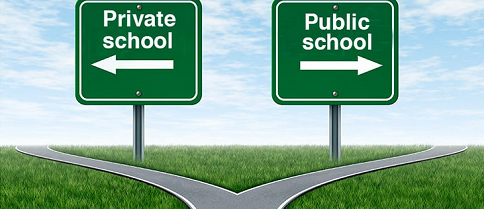Are Private Schools Better Than Public School In Malaysia?
This has become a pertinent question as more Malaysian parents are opting to send their children for private education, despite the soaring costs of living.
What is the edge private education has over the public schooling system? Have parents lost their faith on the quality of public education in the country?
 |
| Private School vs Public School |
Private School vs Public School
Siti Humaira Abbas, 35, sends her three children to an Islamic private school because she believed that it provided her children with a more rounded education.
“It is a different age from the era in which we grew up. The challenges are greater today and the children are exposed to more things at an earlier age. Basic education is no longer enough. The knowledge gained has to be put into practice and adapted into daily routines,” she opined.
Private schooling is also hugely popular among the Chinese community. So much so, that there are those who view their children’s future as bleak if they fail to get into a private Chinese school, which they see as possessing a curriculum superior to that of SJK(C) (public Chinese schools).
Yap Sin Mey, a reporter for a Chinese daily, concurred. The 27-year-old, a product of the national schooling system, furthered her education at a university in Taiwan. There she met with a Malaysian students who received their education from private schools.
“There are obvious differences between the students educated in public and private schools. The latter displays better presence and self-confidence in a social setting,” she explained.
However, Yap did not discount the idea that students from private Chinese schools are a cut above the rest, to begin with, because such schools screen and accept only students of the best academic potential.
This is also the case with students who are accepted into fully residential schools or Maktab Rendah Sains Mara.
Outside The Box
Khazanah Malaysia Academic Advisor Datuk Satinah Ali believes that parents today have the option to provide the best of education for their children.
As someone formerly involved with the country’s education system, Satinah supports the various efforts by the government to provide quality education for children in national schools.
However, she did not brush off the opinion that private schools were superior to public ones when it comes to several aspects, especially management.
Satinah, who is also the Vice President of the Malaysia Association of Education was met after chairing the forum ‘A Peek Into Private Schools in Malaysia – Are They Really Better Then Government Schools?’, organised by the Institute for Democracy and Economic Affairs.
Complete Autonomy
The CEO of the Asia Pacific School, Nina Adlan Disney, believed that there were several things that public schools could learn from from the private schooling system.
From discussions with the management of two branches of a private school and her own experience in the education field, Nina concluded that private schools today were a preffered option because of four aspects.
These are adequate financing, effective pedagogy and syllabus, helpful internal policies and the autonomy and independence to decide their own staffing needs.
“Such autonomy is utilised to provide the best education they can for their students,” she said.
A lecturer from the Monash University’s (Malaysia) School of Business, Dr Grace Lee, echoed Nina’s findings. She personally found many things in private Chinese schools that could be emulated by public schools.
As a product of the national schooling system, Lee who sent her own children to private Chinese schools saw vast differences in the management structure and operation of the school.
“I think that public schools have a lot to learn from independent Chinese schools.
“They could learn how these schools manage to fund themselves while still making the fees affordable. Parents who compete to send their children to Chinese schools are often of the impression that these schools offer a higher quality education for their children,” she said.
Private Islamic schools have also gained popularity among Muslim parents, particularly those who reside in the cities.
According to the director of research outfit IMAN Research, Altaf Deviyati, the fees at such schools are still reasonable and not as exorbitant as those imposed in conventional private schools.
“Parents have the right to decide the kind of education they want to provide their children with and according to their financial capacity. However, the choices are rather limited when it comes to public Islamic schools. If they are lucky, their children may be selected into fully residential Islamic schools or schools funded fully by the state government, such as those in Selangor and Johor,” she said.
In seeking alternatives, some parents would send their kids to “sekolah agama rakyat” or “pondok” schools. Those with more means and residing in the cities may favour the more modern private Islamic schools which teach from an international syllabus, thus availing their children to wider options for tertiary education.
Altaf said the question as to why parents were willing to go to such lengths still remains.
“It is not that they don’t trust public schools, but parents are more concerned of their children losing their sense of self living in today’s borderless world. With that in mind, they become more inclined to choosing schools that do not neglect their roots,” she added.
Narrow The Communication Gap
Satinah conceded that schools should be given autonomy in decision-making. Equally important, she said, is the close relationship between parents, students and teachers that can be usually seen in private schools.
She believed that such good three-way communication was key in producing students who were not only brilliant in academics but with excellent character as well.
She therefore hoped that parents and teachers in public schools would work on closing the communication gap between them.
READ THE ENTIRE PRIVATE SCHOOL VS PUBLIC SCHOOL ARTICLE HERE